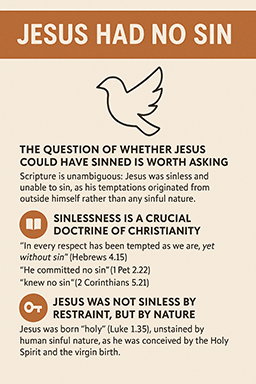Article
Search Articles
Listen
Download Article Summary
Grab a quick summmary to review the highlights of this article.
Download SummaryRelated Articles
Get The Infographic
Get the full sized infopgraphic overview highlighting the key points discussed in this article.
Download Now
Download This Article
The Sinless Christ: Why Jesus Could Not Sin and How His Temptation Differs from Ours
 Loading author...
Loading author...

Jesus Had No Sin — By Nature or by Deed
The question of whether Jesus could have sinned is not just a curiosity, it strikes at the heart of faith. If Jesus could have sinned, then the nature of His divinity and His role as the spotless Lamb of God come into question. If He had internal desires that could be enticed by evil, then He would be no different than Adam. But the testimony of Scripture is clear: Jesus had no sin, did not sin, and indeed could not sin. His temptations, though real, were external and not rooted in any inward corruption or lust. This reality not only upholds the integrity of Christ's divinity and mission but also serves as a powerful contrast to the fallen condition of humanity.
The sinlessness of Christ is a foundational doctrine that numerous passages in Scripture emphasize through both His lack of sinful nature and His perfect moral conduct. Hebrews 4:15 tells us that Christ "was in all points tempted like as we are, yet without sin," while 1 Peter 2:22 declares, "Who did no sin, neither was guile found in his mouth." Similarly, 2 Corinthians 5:21 says God made Him "to be sin for us, who knew no sin." These are not vague generalizations but precise theological declarations that affirm Christ had no internal sin and committed no external act of unrighteousness.
To fully grasp the depth of this truth, it's crucial to understand that Jesus wasn't merely sinless by self-discipline—He was sinless by nature. From the moment of conception, Jesus was "that holy thing" (Luke 1:35), set apart and untainted by Adam's fallen legacy. Unlike every other human, Jesus was not born with the inherited corruption we receive from Adam (Romans 5:12–19). He came by virgin birth, not by the will of the flesh or of man (John 1:13), and was conceived by the Holy Spirit, not through sinful human seed. This preserved Him from the transmission of the sin nature that affects all other humanity.
Some argue that Jesus merely chose not to sin, implying He could have if He had wanted to. This view—called peccability—seeks to emphasize the reality of Christ's temptation, but it misses a crucial truth: Jesus was not just a man; He was—and is—fully God. The correct doctrine is impeccability, which teaches that Jesus could not sin, not simply that He didn't. This understanding flows logically from the nature of God Himself. Since God cannot sin (James 1:13; Titus 1:2), and Jesus is God (John 1:1, 14; 1 Timothy 3:16), therefore Jesus could not sin.
If sinning were even a possibility for Christ, then His divine nature would be compromised. God's essence is holy, immutable, and morally perfect. If Jesus, being God, had even the capacity to sin, then God Himself would be mutable and susceptible to evil—a blasphemous conclusion. Even during His earthly life, Jesus maintained His divine nature. He did not "stop being God" when He became flesh; rather, He added humanity to Himself (Philippians 2:6–7). His two natures—divine and human—were united in one Person, and the divine cannot be tainted.
This is why Jesus says in John 14:30:
"The prince of this world cometh, and hath nothing in me."
Satan found no foothold, no crack, no inward vulnerability in Christ. Jesus had no "own lust" (James 1:14) by which He could be drawn away. This brings us to an important clarification: Jesus was tempted, but not in the same way fallen humans are. James 1:14–15 explains human temptation: "But every man is tempted, when he is drawn away of his own lust, and enticed. Then when lust hath conceived, it bringeth forth sin." Temptation for us is internal because we carry around a fallen nature with inward cravings, so external temptation finds something inside us to hook into. We don't need Satan's personal attention; our own hearts betray us daily.
But not so with Jesus. He had no sin nature, was not drawn away by lust, and His temptations were real but always external. Satan tried to pressure Jesus by appealing to legitimate needs—like hunger (Matthew 4:3), self-preservation (4:6), or power (4:9)—but those were surface-level tests, not inward stirrings. Christ's perfect nature meant that He never even entertained the idea of sin. His will was always aligned with the Father (John 8:29), His delight was in God's law (Psalm 40:8, cf. Hebrews 10:7), and He didn't wrestle with rebellion like we do.
Some argue that if Jesus couldn't sin, then His temptation wasn't real, but that's a flawed comparison. Temptation is not about the ability to fall but the intensity of the test. In fact, because Jesus never gave in, He felt the full weight of temptation in a way we never have. He experienced its full pressure without relief. When we sin, the temptation ends—we surrender. Jesus, however, endured temptation to its maximum strength and still remained holy. Think of it like a soldier under torture: the one who resists to the end experiences more pain, not less, than the one who gives in early. Jesus resisted perfectly, without ever giving in, even when the cross loomed before Him (Luke 22:42–44). So His temptation wasn't less real because He couldn't sin—it was more profound.
The contrast between Christ and fallen humanity becomes clear when we consider their fundamental differences. Jesus possessed a sinless nature that was holy and undefiled, while fallen man carries inherited corruption. Jesus was conceived by the Holy Spirit, while humanity is born in Adam's lineage. Most significantly, Jesus was incapable of sin due to His divine nature, while fallen humanity is fully capable of sin. The source of temptation for Jesus was external only—from Satan and the world—while for fallen humanity it is both internal through lust and external through Satan. Jesus responded to all tests with perfect obedience, while fallen humanity responds with rebellion and guilt. Finally, Jesus achieved complete and eternal victory over sin, while such victory is impossible for fallen humanity without Christ.
This comparison shows that Jesus didn't merely "resist better" than we do. He was ontologically different. We are corrupted at our core, while He was holy by nature. Understanding this distinction is crucial for grasping both the nature of Christ's temptation and the hopelessness of our condition apart from Him.
The question naturally arises: why was Jesus tempted at all? The temptation of Christ served several crucial purposes in God's redemptive plan. First, it proved His identity as the Last Adam. Where Adam failed when tested, Jesus, the "last Adam" (1 Corinthians 15:45), succeeded where the first fell. His triumph validated Him as the head of a new humanity (Romans 5:18–19). Second, His temptation qualified Him as our High Priest. As Hebrews 4:15 says, "For we have not an high priest which cannot be touched with the feeling of our infirmities." His experience of temptation—though external—makes Him compassionate and able to help us in our weakness. Third, His temptation revealed the strength of His holiness. Far from showing weakness, His temptation showcased His invincibility. The temptations were the proving grounds of divine integrity.
Understanding Christ's sinlessness and the nature of His temptation has profound implications for believers. If Jesus had a sin nature, or could have sinned, then He couldn't be our spotless Lamb (1 Peter 1:19), He couldn't make a once-for-all sacrifice (Hebrews 10:10–12), and He'd need a Savior Himself. But because He was sinless, incorruptible, and divine, He could do what no one else could, as 1 John 3:5 declares: "He appeared to take away sins; and in Him is no sin."
"He appeared to take away sins; and in Him is no sin." (1 John 3:5)
For us, this means we must not compare our temptations to His as though they are the same. Ours are contaminated by inward lust while His were not. We cannot overcome sin by imitation of Christ alone but need regeneration—a new nature imparted by the Holy Spirit. Our hope is not in our ability to resist, but in His victory over sin and death.
Jesus did not sin because He had no sin. He could not sin because He is God. And He was tempted not by internal corruption, but by the world and Satan, whose assaults could find no entry point in Him. He is the sinless Savior, the unblemished Lamb, and the Holy One who took our place. His perfection is not a sterile concept—it is our only hope of righteousness.
His temptation was not like ours in kind, but it was greater in intensity. And that means we can trust Him fully—not just as one who understands temptation, but as one who overcame it perfectly. This understanding should fill us with both humility about our own condition and confidence in His finished work.
"Thanks be to God, which giveth us the victory through our Lord Jesus Christ." (1 Corinthians 15:57)
Tags: